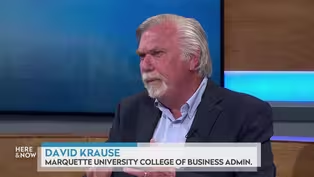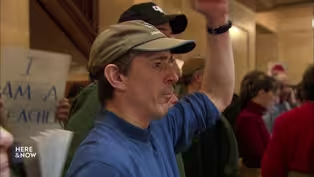Here and Now
Could drought strand mussels again?
Clip: Season 2200 Episode 2246 | 6m 11sVideo has Closed Captions
Drought caused thousands of mussel strandings in 2023, could it happen again a year later?
Severe drought and a build up of dams on the Wisconsin River caused thousands of mussels to die in 2023, but a wide-ranging group of people are trying to find solutions so it doesn't happen again.
Problems playing video? | Closed Captioning Feedback
Problems playing video? | Closed Captioning Feedback
Here and Now is a local public television program presented by PBS Wisconsin
Here and Now
Could drought strand mussels again?
Clip: Season 2200 Episode 2246 | 6m 11sVideo has Closed Captions
Severe drought and a build up of dams on the Wisconsin River caused thousands of mussels to die in 2023, but a wide-ranging group of people are trying to find solutions so it doesn't happen again.
Problems playing video? | Closed Captioning Feedback
How to Watch Here and Now
Here and Now is available to stream on pbs.org and the free PBS App, available on iPhone, Apple TV, Android TV, Android smartphones, Amazon Fire TV, Amazon Fire Tablet, Roku, Samsung Smart TV, and Vizio.
Providing Support for PBS.org
Learn Moreabout PBS online sponsorship>> All right.
Well, Ryan Rasmussen, thanks very much, I appreciate it.
>> Spring storms have pounded Wisconsin in recent weeks, but parts of the state are still experiencing a long term drought that can cause problems for marine life, that need high water levels to survive.
Here and now, reporter Nathan Denzin has more on one species that has been hit particularly hard.
>> We reached peak drought severity in September of last year to just see that crash with almost no rain for a long time was very disturbing.
>> It's been a very dry few years for Wisconsin.
>> I started getting lots of phone calls from people saying the there's all these mussels out there and they're, you know, they're stranded there.
They're dying.
What can we do?
>> It's had a significant impact on a species we hardly think about.
>> I was no longer picking up a mussel and placing it gently in the water.
RFK, Jr, I was throwing them as fast as I could.
has been in a perpetual drought since about 2021, straining aquatic resources despite spring rains.
Drought is still hitting the southwestern part of the state right now near the Wisconsin River.
the fall or usual fall.
Rise did not occur.
And then really, a paucity of snow, especially in northern Wisconsin.
>> Mark Cup is the executive director of the lower Wisconsin State Riverway Board, where he works with the Wisconsin River from Prairie du Sac to the Mississippi.
anything happen with our spring flow that we usually see.
>> Droughts are very stressful to aquatic organisms as well.
>> Ellen Vos is the climate resilience director with the Wisconsin River Alliance.
>> It is average.
>> There's just less space for the things that animals and plants and insects and everything else need to survive.
>> One animal that can be squeezed out by low water is mussels.
>> They're basically just, you know, a mollusk with two shells.
And they live in the rivers and lakes, rivers and streams of Wisconsin.
expert at the Wisconsin DNR.
>> They don't have a brain and they don't have eyes.
So they they you know, they can't just figure out where the deeper water is.
She says there are tens of thousands of mussels on the bed of the Wisconsin River, including 40 different species.
>> They filter as much as ten gallons of water a day per mussel.
and thousands of them, they really help purify the water.
>> But when the drought reached its peak in September, mussels started to wash up on shore banks.
was actually historic artifacts, because the water was so low, I'd never seen it this low in the time I've lived here.
>> Jean Anmuth is a retired DNR scientist who lives near the Wisconsin River in Prairie du Sac.
She was the first person to contact experts when she saw stranded mussels.
>> Mussels are a huge part of the ecology of this river because dams act as a barrier for some aquatic species.
>> Almost all of the mussels in the Wisconsin River can be found be low.
Prairie du Sac back.
>> So I thought, hey, I'd better ring the alarm on the dam.
>> Here is the last of 26 on the waterway because we had such a drought year, the dam did not have water to release many of the dams on the Wisconsin, including Prairie du Sac, have strict federal regulations, while dams keep a reservoir of water on hand to generate electricity.
We federally regulated dams are not allowed to release more water than they receive whatever comes into Lake Wisconsin at the at the very head of the lake comes through the dam.
Those dams are called run of river dams because any water that comes in must go out.
Alliant energy, which owns the Prairie du Sac Dam, in a statement said our license re quires us to maintain the water level.
Therefore we cannot re lease more water during drought conditions.
Not all dams on the Wisconsin River are licensed as run of river fa cilities, and some may manipulate water levels in this sc enario.
wrong.
Everybody was in there in compliance with their license obligations the entire time.
And yet the outcome was thousands or tens of thousands.
We don't know.
Dead mussels on the river.
>> That meant the only solution to save the mussels was to physically walk the shore banks and throw them back into the river.
Just saying.
We know that this is a problem.
If you're able to help, please go out to the river.
spending 3 to 4 hours.
Forget the artifacts.
I was no longer looking at that.
mussels saved.
I mean, individuals were picking up 100 mussels a day, 300 mussels a day.
I mean, it was pretty amazing what people were willing to do.
>> Anmuth saved more than 1200 herself.
a year and just those 1200 mussels, you you're filtering like over 3 million gallons of water.
>> I know that we made a difference.
And that will pay dividends down the road.
>> Extended forecasts for the summer show that for the fourth straight year, drought conditions are likely.
Let's just assume that we run into a similar situation and we don't have rain, particularly in the northeast and central part of the state.
.
And that is yes.
We will need to do muscle rescues again.
>> There is a live, phone tree muscle rescue alert system in place.
>> They can also contact me anytime and I can give them, advice as to what to do until the time comes to walk the shore banks again, experts eyes will be glued to the weather for be glued to the weather for
9,000 Signatures Submitted in Another Effort to Recall Vos
Video has Closed Captions
Clip: S2200 Ep2246 | 25s | Signatures were submitted in a second attempt to recall Assembly Speaker Robin Vos. (25s)
David Krause on WRS Investing Millions into a Bitcoin ETF
Video has Closed Captions
Clip: S2200 Ep2246 | 5m 27s | David Krause on the Wisconsin pension system's $100 million purchase into a Bitcoin ETF. (5m 27s)
Here & Now opening for May 31, 2024
Video has Closed Captions
Clip: S2200 Ep2246 | 1m 21s | The introduction to the May 31, 2024 episode of Here & Now. (1m 21s)
Oral Arguments Over Act 10 Lawsuit in Dane County Court
Video has Closed Captions
Clip: S2200 Ep2246 | 1m 24s | Lawsuit challenging Act 10 heard oral arguments from those representing public employees. (1m 24s)
Rep. Joel Kitchens on Bill Requiring Phonics Reading Method
Video has Closed Captions
Clip: S2200 Ep2246 | 6m 5s | Joel Kitchens on a bill that requires the "phonics" method to teach children how to read. (6m 5s)
Ryan Rasmussen on New I.D. Requirements for Food Pantries
Video has Closed Captions
Clip: S2200 Ep2246 | 5m 21s | Ryan Rasmussen on new identification rules to access food pantries receiving federal aid. (5m 21s)
Providing Support for PBS.org
Learn Moreabout PBS online sponsorship
- News and Public Affairs

Top journalists deliver compelling original analysis of the hour's headlines.

- News and Public Affairs

FRONTLINE is investigative journalism that questions, explains and changes our world.












Support for PBS provided by:
Here and Now is a local public television program presented by PBS Wisconsin





